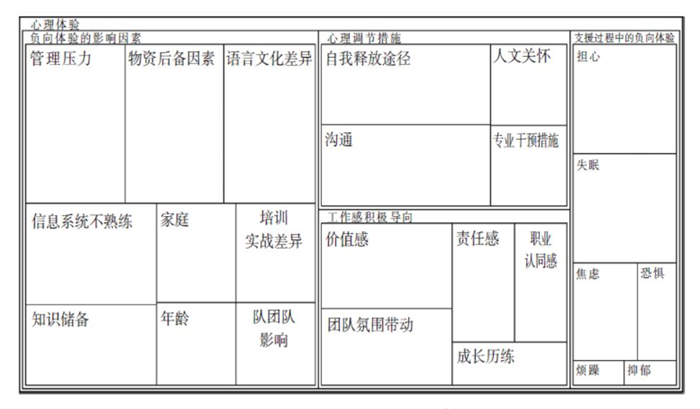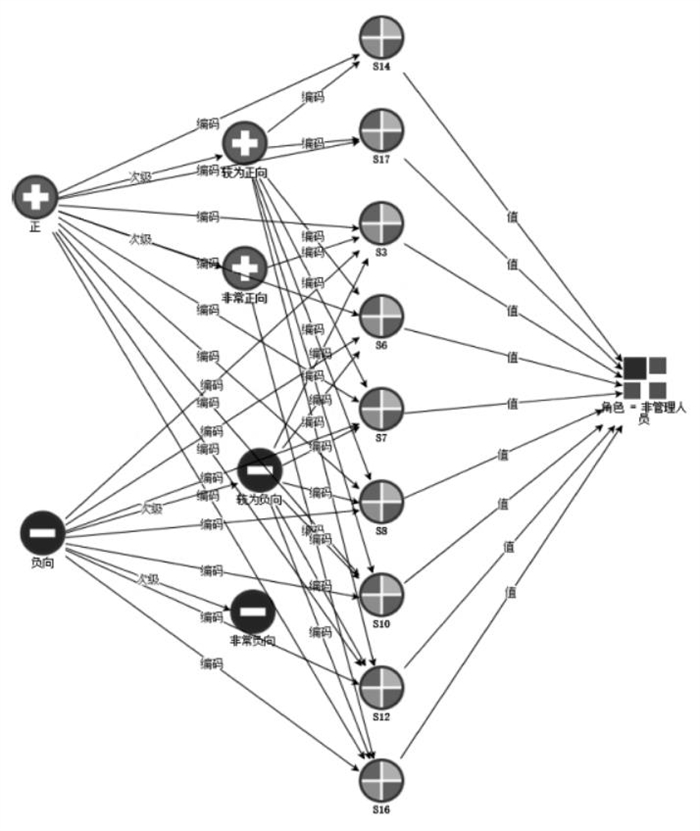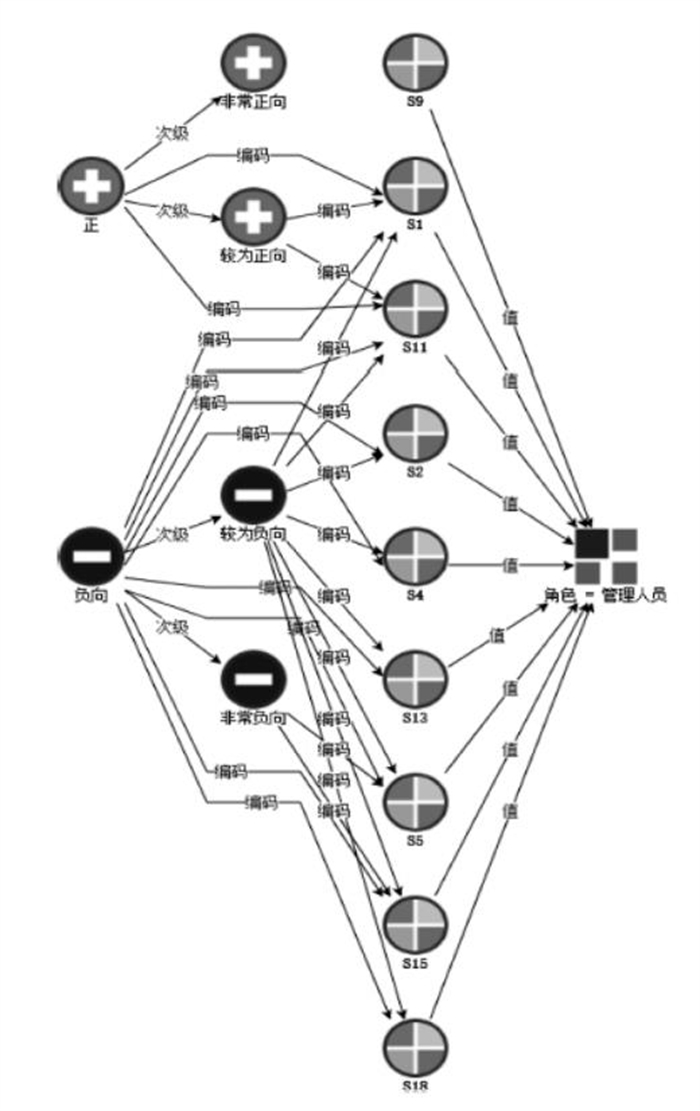Psychological experiences of different roles of nurses in response to public health emergencies: a phenomenological study
-
+ English摘要:目的 分析不同角色护理人员应对突发公共卫生事件的心理体验特点,以便为护理人员负向心理制定针对性的干预策略。方法 基于信息饱和原则,在2022年7—8月采用目的抽样法对不同角色的护理工作者进行半结构式访谈,运用QSR Nvivo 11.0软件整理、分析访谈资料。结果 共纳入18名护理人员进行访谈,其中管理者、非管理者各9名。依据访谈材料确定出4个树状节点:工作感的积极导向、支援过程中的负向体验、负向体验的影响因素和心理调节措施;高频词汇是“问题”“工作”“影响”“心理”“压力”和“沟通”等;在“负向体验的影响因素”树状节点中最重要的子节点是“管理压力”;在“心理调节措施”树状节点中最重要的子节点是“自我释放途径”;在“工作感的积极导向”树状节点中最重要的子节点是“价值感”;在“支援过程中的负向体验”树状节点中最重要的子节点是“担心”。护理管理人员负向消极的矩阵编码单词数占比大于非管理人员,正向积极的矩阵编码单词数占比小于非管理人员。结论 突发公共卫生事件中的一线应急护士存在不同程度的负性心理趋向,其中管理人员表现更为突出。应在应急工作中针对护理管理者制定相应的心理调整干预策略。
-
提升护理人员的应急管理能力是做好疫情常态化防控的必然要求,应对突发公共卫生事件(以下简称突发公卫事件)时一线护士的心理压力疏导需高度重视[1-3]。护理管理者是各级别卫生机构和临床实践之间的纽带桥梁,在推行卫生健康政策和管理临床护士等层面具有重要的作用[4],他们在一线护理人员心理健康和整体护理质量等方面的影响广泛[5]。然而针对护理管理者的应对突发公卫事件的心理体验质性研究较少。本研究拟借助Nvivo分析软件,对不同角色的护理人员(管理者和非管理者)应对突发公卫事件的心理体验和特点进行分析,以期为制定针对性的干预策略提供参考依据。
1. 对象与方法
1.1 对象
采用目的抽样法,在2022年7月5日—8月18日对苏州市某三级甲等医院有过突发公卫事件支援经验的一线护理人员进行访谈。纳入标准:(1)承担过应对新冠疫情或其他突发公卫事件的一线护理工作;(2)具备护理职业资格;(3)知情同意,愿意充分表达相关真实体验和感受。访谈样本量以“信息饱和”原则为标准确定,即在分析新资料时一直到没有新信息出现为止[6]。本研究共访谈18名护理人员,平均年龄(36.83 ± 7.65)岁,平均工作年限为(15.33 ± 8.94)年,按照突发公卫事件支援的不同职务角色将研究对象分为管理人员(9名)与非管理人员(9名)两类。访谈对象一般资料见表 1。本研究于2021年1月获得苏州大学附属第二医院伦理委员会批准(批件号:JD-LK-2021-013-01)。
表 1 研究对象一般资料访谈编号 性别 年龄 岗级 工作年限 在突发公卫事件中的职责 S1 女 39 N3 16 护理管理者 S2 女 40 N3 16 护理管理者 S3 女 32 N2 10 一线护士 S4 女 47 N4 29 护理管理者 S5 女 52 N5 33 护理管理者 S6 女 33 N3 11 一线护士 S7 女 34 N3 16 一线护士 S8 女 31 N2 4 一线护士 S9 女 39 N3 16 护理管理者 S10 女 24 N1 2 一线护士 S11 女 43 N3 24 护理管理者 S12 男 38 N3 16 护理管理者 S13 女 34 N3 12 护理管理者 S14 女 33 N3 13 一线护士 S15 女 49 N4 31 护理管理者 S16 女 28 N2 6 一线护士 S17 女 25 N1 3 一线护士 S18 女 42 N3 18 护理管理者 1.2 方法
1.2.1 确定访谈提纲
采用质性研究中现象学的研究方法,以面对面形式与访谈对象进行半结构式深入访谈。研究团队中纳入有心理疏导资质的9名护理专家,均长期从事护理管理及临床护理工作,有丰富的突发公卫事件相关管理经验。基于社会资本理论[7]结合前期量性研究结果,根据文献回顾和研究目的初步制定访谈提纲,选取2名研究对象进行预访谈,根据预访谈结果调整、完善提纲,确定最终访谈提纲,基本内容为:(1)请分享一下您参与突发公卫事件的经历,如果在工作中再次遇到突发公卫事件,您最担心什么?为什么?(2)在应对突发公卫事件时您的心理体验历程是怎样的?(3)您认为在这过程中影响心理体验的因素是什么?(4)您认为哪些措施将有助于改善这过程中的心理体验?(5)有关应对突发公卫事件中出现的心理体验内容您还有补充的吗?
1.2.2 资料收集方法
采用半结构式深度访谈法,由2名经过严格培训的访谈队员对研究对象进行面对面访谈,访谈时间范围为30 ~ 60 min,平均访谈时间为(38.99 ± 12.31)min。访谈队员与研究对象提前约定时间和地点,保证过程安静舒适,全程同步录音。访谈前,向研究对象详细解释研究目的、方法和保密原则。访谈过程中认真倾听,仔细观察访谈对象的肢体动作、面部表情等非语言信息。
1.2.3 资料分析方法和工具
研究步骤采用Colaizzi现象学七步分析法[8]进行。借助QSR Nvivo 11.0软件,利用其编码功能对资料进行归纳分析,主要编码分为自由节点(free nodes)和树状节点(tree nodes)两种,具体分析方法如下:
(1)建档:在Nvivo软件中新创建一个命名为“不同角色护理人员应对突发公卫事件的心理体验质性研究”新项目,并创建该所属项目的源文件,命名为“突发公卫事件访谈资料”,用于储存转换为Word文本的访谈资料。每访谈一位护理人员结束24 h之内,人工将录音文件逐字逐句转换为Word文本信息,将每份访谈记录文本采用匿名方式进行S1 ~ S18的编号处理并导入至QSR Nvivo 11.0软件中。
(2)编码,建立节点:在软件中仔细阅读所有访谈材料并进行编码,即将收集到的访谈材料分解、辨析并赋予概念,并将提取的参考点集合成节点。编码时,若一段文字内容涵盖不同节点的意思,则将其标记在不同节点下。比如“最担心有突发情况,手机必须是24 h通畅的,经常连环呼叫。有一次夜里两点多打电话,还是比较紧张的,怕有问题而导致经常失眠。”这段文字既属于“担心”自由节点,又属于“失眠”自由节点。若不能确定某段文字内容所属的节点应该放在哪个树状节点下,则暂时标记为自由节点,反之则将文字内容标记为某个子节点,然后放在某个树状节点下。比如,被访谈到“对低年资的一线支援护理人员,都会加他们微信,有问题就和团队微信群里的心理老师进行沟通,让组长去主动关心他们”,将这段文字标记为“专业干预措施”子节点,并放置在“心理调节措施”树状节点下。
(3)调整比较,修改校正:在对文本所有内容编码结束后,利用软件提取某一节点下的所有文本编码内容,仔细阅读斟酌,根据节点的内容对节点的名称进行必要的修改;针对编码节点进行深度探讨,对于含义相同的编码进行节点重组,对于自由节点形成的树状节点逻辑性进行核查,再讨论形成最终节点主题。比如,最初编码时,“心理师干预”子节点直接放在“心理调节措施”树状点下,但考虑到“药物干预”也属于专业心理调节措施的一种,因此将“心理师干预”和“药物干预”两类措施均归为“专业干预措施”节点中,之后将“专业干预措施”放置在“心理调节措施”树状节点下。调整完成后为保证数据质量,研究者对访谈资料的编码进行复核并邀请其他研究者进行原始资料的对比,以保证资料的真实有效。
(4)赋予属性,矩阵编码:在“分类”栏目中进行新建“案例节点分类”,为每一位访谈对象创建单独案例,根据访谈过程中的突发公卫事件经历赋予每一份案例单独的属性,即新建角色属性,角色(属性)共分为管理者和非管理者两类,每类角色各为9名。对不同角色护理人员在应对突发公卫事件时的心理体验结构上的差异进行矩阵编码,之后运用“新建项目图”功能直观化展现矩阵编码结果。
2. 结果
2.1 编码结果
研究者通过开放式、关联式和选择式编码对18份访谈资料进行分析,确定出4个树状节点:工作感的积极导向(A)、支援过程中的负向体验(B)、负向体验的影响因素(C)和心理调节措施(D);24个子节点:成长历练(A1)、价值感(A2)、职业认同感(A3)、团队氛围带动(A4)、责任感(A5),烦躁(B1)、抑郁(B2)、恐惧(B3)、焦虑(B4)、担心(B5)、失眠(B6),对团队影响(C1)、年龄(C2)、家庭(C3)、培训实战差异(C4)、知识储备(C5)、管理压力(C6)、信息系统不熟练(C7)、物资后备因素(C8)、语言文化差异(C9),人文关怀(D1)、专业干预措施(D2)、自我释放途径(D3)、沟通(D4)。
2.2 词频分析
对访谈材料进行词频分析,停用无意义的数字、单字或语气助词后,形成词语云图。如图 1所示,词语云中字号的大小代表相关词汇在文本中的出现频次,字号越大,出现频次越多。主要的高频词汇是“问题”“工作”“团队”“医院”“经历”“影响”“心理”“时间”“压力”和“沟通”等。
2.3 节点层次分析
使用Nvivo 11.0软件中的可视化节点层次图表功能,以节点编码参考点的数量为依据,形成了不同节点占比差异的层次分析图(见图 2)。首先,就树状节点而言,负向体验的影响因素,即在支援过程中影响一线护理人员产生负向心理情绪体验的相关因素占据最重要的位置,其次为心理调节措施,再次为工作感的积极导向,最后是支援过程中的负向体验。在“负向体验的影响因素”树状节点中最重要的子节点是“管理压力”,其次为“物资后备因素”,此外,“语言文化差异”“信息系统不熟练”和“知识储备”的相应节点占比也较大;在“心理调节措施”树状节点中最重要的子节点是“自我释放途径”,其次为“沟通”;在“工作感的积极导向”树状节点中最重要的子节点是“价值感”,其次为“团队氛围带动”;在“支援过程中的负向体验”树状节点中最重要的子节点是“担心”,其次为“失眠”。
2.4 矩阵编码分析
按照被访谈护理人员在应对突发公卫事件中担任的职务角色,将人员类型分为非管理人员和管理人员两类;按照内在驱动力表现不同,并结合以往心理学和质性研究将心理体验分为正向积极和负向消极两类;利用Nvivo 11.0软件中的矩阵编码功能查看两个项目列表之间的编码交点,比较两类人群的不同心理体验态度,生成节点矩阵并保存(见表 2)。利用软件中新建项目图功能,采用分层有向布局方式展示不同角色下护理人员应对突发事件的资料、节点与心理体验之间的关系(见图 3、图 4)。如表 2和图 3、4所示,不同职务角色护理下,护理管理人员负向消极的矩阵编码单词数占比大于非管理人员占比,正向积极的矩阵编码单词数占比小于非管理人员占比。
表 2 不同角色护理人员应对突发公卫事件心理体验的矩阵编码心理体验结果 已编码的单词数(占比/%) 管理人员 非管理人员 正向积极 221(9.73) 2 051(90.27) 负向消极 4 394(61.19) 2 787(38.81) 3. 讨论
3.1 护理人员应对突发公卫事件心理体验访谈资料词频分析
词语云图可直观展示出访谈材料主要关注的词汇。对各个词汇进行归纳总结,可得出访谈材料的相应潜藏内容为:“在应对突发公卫事件工作过程中,一线护理人员可能被派遣至不同医院,会遇到各类亟须解决的问题,受支援的高强度压力等相关因素影响,过程中会产生各种不容忽视的心理体验经历,主要解决措施可能为沟通输出。”在高频词汇中,“工作”“医院”“经历”与研究的突发事件经历主题相符;“问题”“心理”与研究的心理体验主题相符(一般出现的问题可能为压力等因素导致的心理问题,其次还可能出现物资匮乏等各类相应后勤问题);“大家”“影响”“压力”与研究的应对突发公卫事件过程中产生的心理体验影响因素主题节点相符;“沟通”为应对突发公卫事件过程中产生不良心理的解决措施;“东西”为抽象名词,可能表示的含义为支援过程中需要的物资等相应物品。以上图示综合结果与本文“不同角色护理人员心理体验”研究主题相符,但词语云无法体现出访谈资料中的具体细节和分布特征,因此需要结合编码内容和参考点进一步分析。
3.2 护理人员应对突发公卫事件心理体验访谈资料节点层次分析
层次分析图显示,“负向体验的影响因素”树状节点占据最重要的位置,而“支援过程中的负向体验”则属于最小范围的树状节点,说明护理人员为能够实现成功应对突发公卫事件的既定目标,在支援过程中尽管受各种因素影响而存在负向心理体验,却能够不断调整适应个体的心理弹性水平,迎接挑战。这与Che等[9]研究结果相似,即与突发公卫事件大流行前相比,医护人员的心理弹性水平更大,抗压能力更强。负向消极心理影响因素中占据最重要位置的为“管理压力”,这与来自瑞士的一项研究结果[4]相似。护理管理者在应对突发公卫事件过程中必须保证与各个部门之间的沟通协作[10],在面对与疫情相关的不同变化背景下,其间的信息交流、规划和管理也必须随之发生变化以应对与不同人员间的处理局势。由于此类管理压力等造成的心理负面消极影响(如失眠)会延长至应对突发公卫事件结束后期,这就提示我们政府或医院管理组织在关注一线护理人员心理状态变化的同时也应重视护理管理人员的心理状态。此外,“物资后备因素”在影响一线护理人员产生负向心理体验过程中也占重要位置。当防护设备短缺时,一线护理人员的内心恐惧和压力会相应增加[10],相关管理人员应在后勤物资、防护设备等外界资源方面提前做出保障措施,做好“未雨绸缪”的应急准备措施。
护理人员在应对突发公卫事件时在工作感的积极导向中占据最重要位置的是“价值感”,其次为“团队氛围带动”。研究[11]表明,在应对突发公卫事件过程中,一线护理人员会表现出高度的责任感和使命感,并在护理工作中获得了成就感,实现了自我价值,这也与此次研究的“价值感”的积极导向相一致。领导的支持、团队的力量等“团队氛围带动”也使促使了一线护理人员的积极工作行为,将保护人民健康的精神面貌很好地展现了出来。建议管理者在突发公卫事件期间多传播一线护理人员的事迹,进一步调动他们工作的积极性。
另外,护理人员在应对突发事件的心理调节措施中占据最重要位置的为“自我释放途径”,其次为“沟通”,说明护理人员在经历心理问题时首先从自我角度考虑、解决问题。虽然一线护理人员利用自我释放心理问题在某种程度上会减轻护理管理人员或者团队的压力,但当在心理问题上升至个体无法承担的地步时再行外界干预,其后果可能反而会更严重。有研究结果[12]显示,在突发公卫事件支援过程中,当一线护理人员寻求心理支持时会由于外界眼光异样等原因,在某种程度上延迟自动寻求外界心理援助的进程,因此护理管理者应更加关注一线支援护理人员的心理感受进程。当个体的性格或行为表现与平时不相符时,更应主动去重视。
值得注意的是,在突发公卫事件支援过程中的最主要负向体验为“担心”,其次为“失眠”。面对突发公卫事件时的危险性、未知性或可怕性均会导致一线支援人员的“担心”体验,而随之而来的由于工作量激增、培训实战差异或工作环境陌生等因素导致的失眠症状体验也是不可忽视的负向体验之一。研究[13]表明,睡眠障碍对于护理人员的不良健康后果有直接影响,如神经紧张、对工作缺乏耐心、家庭生活或社交生活质量降低等。因此,必须应尽早意识到失眠的重要影响,并采取一切可能的措施来对抗这些风险[13]。
3.3 不同角色护理人员应对突发公卫事件心理体验特点分析
编码单词数与相应占比研究结果显示,护理管理者在参与突发公卫事件时的负向消极心理编码节点数多于非管理者,表明尽管一线护理人员均存在不同程度的负性心理趋向,但其中护理管理人员的负性心理趋向因管理压力大等原因表现得更为突出。定性研究发现,护理管理者在不同防控阶段面临着与疫情相关的不同关系协调模式的变化,经历着不同的、相互冲突的情绪体验,并且在某种程度上不得不改变自己的角色和领导风格[4],以上原因均在不同程度上影响着护理管理者的心理状态[14]。管理者的负向消极心理远远高于非管理者,可能是因为护理管理者会更注重从整体层面出发关注护理团队问题,由于侧重点在整体护理团队绩效[1]而忽视了自身存在的负向心理。因此,为保证护理管理者全程的身心健康,应适时安排专业心理干预措施减缓他们的负向消极情绪。
本研究结果显示,护理管理者在应对突发公卫事件过程中的正向积极心理编码单词数与占比少于非管理者,提示在原本应急防控的管理范畴之上也应纳入对护理管理者的正向积极心理的调节措施,以增加相应积极行为。研究[15]显示,管理者在与合作者协调沟通过程中的开放性、可行性、信任和互相尊重的积极环境有利于心理安全和降低不适心理水平。因此,保证护理管理者与其他组织管理者之间的关系也能对建立正向积极的氛围环境提供良好的基础。护理管理者在为一线护理人员提供心理弹性训练的同时,也必须拓宽自己的知识技能领域,适应不同的组织管理模式以保证自己迅速适应突发事件带来的变化[9]。
3.4 小结
尽管一线护理人员均存在不同程度的负性心理趋向,但护理管理人员因管理压力大等原因表现更为突出,提示应对突发公卫事件过程中一线护理管理人员的心理体验变化更应引起重视。下一步研究拟结合前期量性研究结果,建立心理体验模型,深入探究心理波动变化情况。此次访谈研究对象仅为苏州市内参与一线突发事件的护理人员,尚未拓展至全国范围内进行调查,后期将扩大研究范围做进一步分析。
作者声明 本文无实际或潜在的利益冲突 -
表 1 研究对象一般资料
访谈编号 性别 年龄 岗级 工作年限 在突发公卫事件中的职责 S1 女 39 N3 16 护理管理者 S2 女 40 N3 16 护理管理者 S3 女 32 N2 10 一线护士 S4 女 47 N4 29 护理管理者 S5 女 52 N5 33 护理管理者 S6 女 33 N3 11 一线护士 S7 女 34 N3 16 一线护士 S8 女 31 N2 4 一线护士 S9 女 39 N3 16 护理管理者 S10 女 24 N1 2 一线护士 S11 女 43 N3 24 护理管理者 S12 男 38 N3 16 护理管理者 S13 女 34 N3 12 护理管理者 S14 女 33 N3 13 一线护士 S15 女 49 N4 31 护理管理者 S16 女 28 N2 6 一线护士 S17 女 25 N1 3 一线护士 S18 女 42 N3 18 护理管理者 表 2 不同角色护理人员应对突发公卫事件心理体验的矩阵编码
心理体验结果 已编码的单词数(占比/%) 管理人员 非管理人员 正向积极 221(9.73) 2 051(90.27) 负向消极 4 394(61.19) 2 787(38.81) -
[1] 吴欣娟, 王钰, 柳鸿鹏. 新冠肺炎疫情常态化防控形势下对护理专业价值的思考[J]. 中国护理管理, 2021, 21(5): 641-645. doi: 10.3969/j.issn.1672-1756.2021.05.001 [2] 王利敏, 鲁才红, 胡梦云, 等. 重大突发公共卫生事件下综合医院护理人员应急心理服务体系的构建[J]. 护理学杂志, 2022, 37(7): 67-70. https://www.cnki.com.cn/Article/CJFDTOTAL-HLXZ202207020.htm [3] 姜金霞, 朱晓萍, 邵海燕, 等. 上海支援护士对重症新型冠状病毒肺炎患者照护体验的质性研究[J]. 职业卫生与应急救援, 2021, 39(1): 103-106. doi: 10.16369/j.oher.issn.1007-1326.2021.01.022 [4] BIANCHI M, PRANDI C, BONETTI L. Experience of middle management nurses during the COVID-19 pandemic in Switzerland: a qualitative study[J]. J Nurs Manage, 2021, 29(7): 1956-1964. doi: 10.1111/jonm.13339
[5] 杨柳, 任军丽, 李海鸿. 服务型领导理论在护理管理领域应用研究现状[J]. 护理研究, 2021, 35(19): 3483-3485. doi: 10.12102/j.issn.1009-6493.2021.19.021 [6] CRESWELL J W, POTH C N. Qualitative inquiry and research design: choosing among five approaches[M]. 4th ed. Thousand Oaks: SAGE Publications, 2018: 646.
[7] 张文宏. 从社会资本的视角反思突发公共卫生事件中的社会治理[J]. 武汉大学学报(哲学社会科学版), 2021, 74(5): 148-155. [8] ENGLANDER M. The phenomenological method in qualitative psychology and psychiatry[J]. Int J Qual Stud Health Well-being, 2016, 11: 30682. doi: 10.3402/qhw.v11.30682
[9] CHE YUSOF R, NORHAYATI M N, AZMAN Y M. Experiences, challenges, and coping strategies of frontline healthcare providers in response to the COVID-19 pandemic in Kelantan, Malaysia[J]. Front Med(Lausanne), 2022, 9: 861052.
[10] DING S, DENG S, ZHANG Y, et al. Experiences and needs of front-line nurses during the COVID-19 pandemic: a systematic review and qualitative meta-synthesis[J]. Front Public Health, 2022, 10: 805631. doi: 10.3389/fpubh.2022.805631
[11] 王金英, 何江娟, 朱建美, 等. 2019冠状病毒病患者照护护士工作体验的质性研究[J]. 浙江大学学报(医学版), 2020, 49(4): 480-486. https://www.cnki.com.cn/Article/CJFDTOTAL-ZJYB202004018.htm [12] QUEIROZ A M, SOUSA A R D, MOREIRA W C, et al. The novel COVID-19: impacts on nursing professionals' mental health[J]. Acta Paul Enferm, 2021, 34: E2523.
[13] KNAP M, MACIAG D, TRZECIAK-BEREZA E, et al. Sleep disturbances and health consequences induced by the specificity of nurses' work[J]. Int J Environ Res Public Health, 2022, 19(16): 9802.
[14] ZAMANZADEH V, VALIZADEH L, KHAJEHGOODARI M, et al. Nurses' experiences during the COVID-19 pandemic in Iran: a qualitative study[J]. BMC Nurs, 2021, 20: 198.
[15] ZHAO F, AHMED F, FARAZ N A. Caring for the caregiver during COVID-19 outbreak: does inclusive leadership improve psychological safety and curb psychological distress? A cross-sectional study[J]. Int J Nurs Stud, 2020, 110: 103725.
-
期刊类型引用(2)
1. 吴俊,郭丹妮. 低年资护士角色压力与职业认同感的相关性及其职业认同感的影响因素分析. 中国当代医药. 2024(21): 150-154 .  百度学术
百度学术
2. 王珍,唐薇敏. 应急预案护理管理在医院面对突发公共卫生事件中的护理管理价值. 中国卫生产业. 2024(20): 83-85+100 .  百度学术
百度学术
其他类型引用(0)





 下载:
下载:




